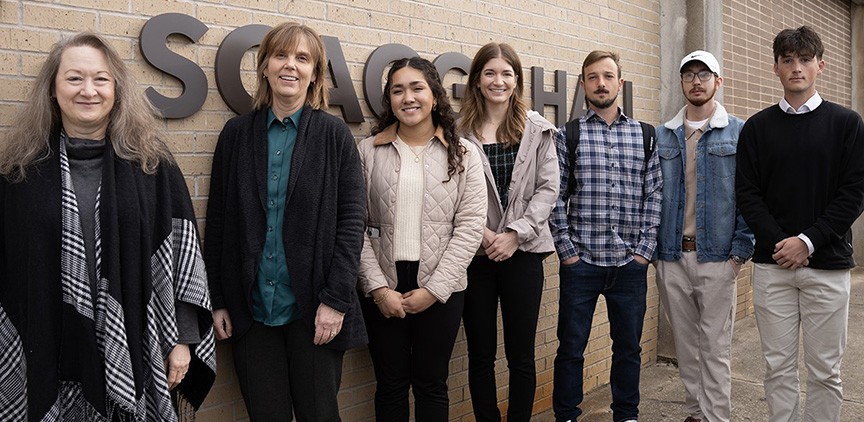Field trip

Meridian Community College students Isaac James, Samuel Swanner, Allondra Arreola-Espino, Kaitlyn Hebig, and Thiago Martins-Fasano joined with Dr. Angie Carraway, chemistry instructor and chair of the science and wellness division, and Valerie Bishop, dean of institutional effectiveness and SACSCOC liaison, attended the Mississippi Academy of Sciences (MAS) meeting on the campus of the University of Southern Mississippi.
The annual conference, sponsored in part by the Mississippi IDeA Network of Biomedical Research Excellence (INBRE), attracts attendees from colleges and universities across the state to learn about the scientific research being done in Mississippi.
Dr. Carraway noted the MCC students who attended are headed for careers in which research could play an important part. “We think that exposing them to this type of meeting is needed if we are to adequately prepare them for what we think they will face at senior institutions and beyond,” she said.
She added, “We know of at least three students that we have taken to the Mississippi Academy of Sciences that have been directly impacted in some way by that attendance,” she said.
Chance Anderson, who graduated from MCC in 2017, continued his studies at Mississippi State University and presented a portion of his master’s research in 2021 at the MAS. Today, he works in the greater Memphis area for two different research groups engaged in molecular biology. Mallory Harmon, who also graduated from MCC in 2017, applied for and completed an internship she learned of while at MAS. Dr. Carraway noted, “It directly impacted her admission to medical school. She has graduated from the University of Mississippi Medical Center and is in residency,” she said.
Another MCC alum, Joy St. Claire, participated in an undergraduate chemistry research project and completed a summer research internship last summer.
Bishop noted attending an academic meeting like MAS allows community college students the opportunity to see what and how students at four-year institutions are learning science. "Learning theory while sitting in a lecture is very different from conducting original research that is an application of multiple areas: science, math, writing, and computer skills,” she said.
She added, “Students see that things are imperfect in the ‘real world.’ Failures happen, and failures allow one the chance to reevaluate, reset, and keep trying.”
MCC student Fasano, who encountered presenters at the graduate level, said he got a glimpse of how the research environment works. “It was good to see where this comes from,” he added.
Visit meridiancc.edu for more information.

